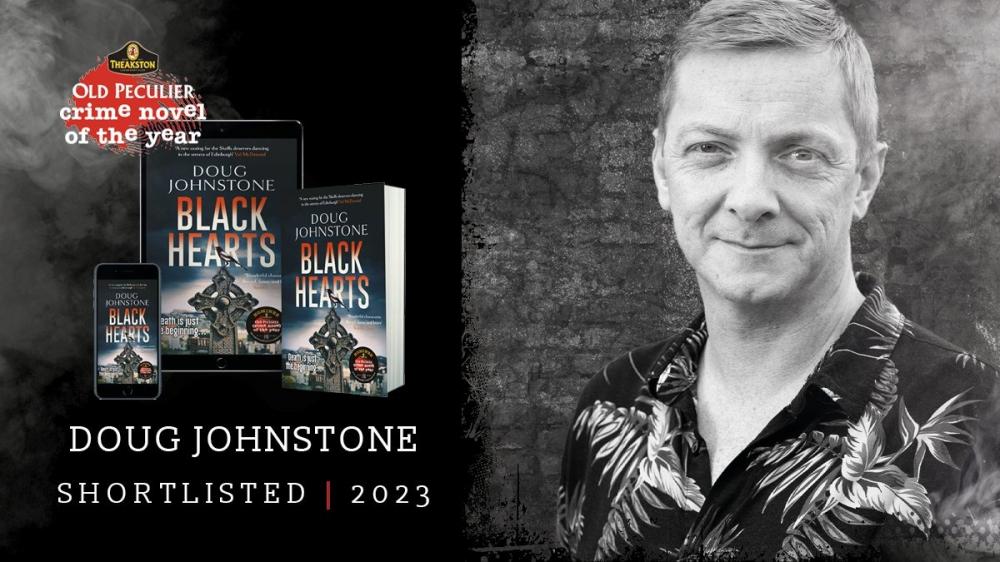search
date/time
 | Lancashire Times A Voice of the Free Press |

Andrew Palmer
Group Editor
10:46 AM 8th July 2023
arts
Interview
Theakston Crime Novel Of The Year Award - Doug Johnstone

As I start to mumble an apology, he laughs and says, "Don’t worry, ever since I started writing these books, people come up to me all the time with ideas; it's great."
It is a genuine sentiment. Johnstone is a nice guy, highly entertaining and a really interesting person to interview.
"In fact, at the beginning of Black Hearts, there is a fist fight at an open grave. I kind of made that up, but I also recently read a report about police in Scotland being called out to hundreds of funerals and wakes every year. So it definitely happens."
His latest novel, which is on the shortlist for the Theakston Old Peculier Crime Novel of the Year, is about a group of related Skelf women, a grandmother, mother, and daughter, who have to run a funeral directors firm and a private investigation agency.
Johnstone has a PhD in nuclear physics; that’s right, it is not a joke. He says that it always gets a laugh at book events because people nervously think it is a joke. He designed radar and missile guidance systems for military aircraft before his literary career took off.

"It’s really fascinating; it started as a kind of joke, but it has become a really great source of fun for all of us and camaraderie, which is good because it can be a kind of solitary existence for writers."
I am interested in people at the edges of society, which quite often involves criminal activity
There’s even more to this polymath, but before I get distracted, I want to know where the idea of the Skelf women came from.
"I think writers are always scared of answering that kind of question in case the ideas vanish in a puff of smoke. In my case, one of the roots is very obvious. I was a writer in residence at a funeral director firm a few years ago, and to cut a very long story short, I was employed for six months to write a piece of nonfiction about the staff and their attitudes to life and death in the face of what they were living with within the funeral industry.
"That experience stuck with me for a long time, and I wanted to write about it in some way as well as about private detectives who don’t know how to be PIs because they inherit the job.
Eventually, I just jammed those two ideas together."
Like many of us, Johnstone was fascinated when he was growing up by private eyes and detectives. He admits to loving Columbo and particularly the Rockford Files. He liked the idea that they did not know what they were doing and were not exactly experts.
"I think that is great, and apart from anything else, it means that as a writer, I go off to learn how the experts do it because the characters don't know either, so I am on the same learning curve.

But you are probably wondering, why the move from nuclear physics to crime fiction?
It turns out he always wanted to write something, and the fascination he had as a kid for private eyes never went away.
"It happened naturally; I wasn't even aware that I was writing in the crime genre. When I first started, I read very widely. As a kid, I read all sorts: science fiction and fantasy, crime, literary fiction, and romance—anything really.
I wasn't really all that aware of the crime genre, but I am interested in people at the edges of society, which quite often involves criminal activity, and I was attracted to the repercussions of crime. All good fiction revolves around conflict and tension."
"A lot of genres have elements of crime fiction in them these days because it's such an engaging and propulsive way to keep the reader interested; people are interested in how crimes are solved, how crimes are committed, how people respond to being victims of crime, all these kinds of things, and I think that's just human nature, isn't it?"
We both agree that crime fiction is an incredibly diverse genre, and you only have to look at the shortlist for the Theakston Old Peculier Crime Novel of the Year to see the diversity of books.
As I frequently hear, people like the puzzle-solving element, but as Johnstone so eloquently says, "It's a sort of shortcut to the human psyche like psychology because it's people at their best, worst, and most extreme.
"It's always most interesting to examine characters when they're really pushed to their limits, and that invariably is crime fiction because they're either involved in some positive or negative ways, and I think it's really interesting to reveal the human psyche in that way in extreme circumstances."
Everyone loses people, and so I think it's really interesting to dig as deep as possible into how the characters react in those circumstances
With that in mind, I move on to the psychological development of the Skelf women because, as Johnstone said earlier, they're dealing with death and loss every day and with other people’s grief, and they have these mysteries to solve."I found that as the books have gone on, I have generally become more interested in the three central characters than in solving mysteries, although that still exists obviously, but I'm more interested in how they navigate their way through this sort of very tricky psychological landscape that they're having to deal with all this stuff. In Black Hearts, out of the four books, there's some extreme behaviour from all the characters. which in the end comes down to loss and grief and how there's not one kind of way of grieving.
There's not one method of doing things or a right or wrong way; people react in different ways to that sense of loss, and that's universal. Everyone loses people, and so I think it's really interesting to dig as deep as possible into how the characters react in those circumstances."
Writers are interested in how authors sketch out their plans, and when I ask Johnstone, he tells me he spends a month just writing random notes about things he might want to write about that have occurred to him.
"But they have to be interesting because it's important to be fascinated by the subject matter as I will be writing about it for months or years.
"Gradually it coalesces into ideas about characters and structure; towards the end I have quite a strong structure and certainly the beginning in the end with a little bit of wriggle room in the middle to get from one character to the other, and that invariably changes as I start writing, but it's nice to have a kind of blueprint to start."
In Black Hearts, out of the four books, there's some extreme behaviour from all the characters. which in the end comes down to loss and grief...
Doug Johnstone is a Renaissance man, and I haven’t yet told you he is a songwriter and football player for the Scottish Writers Football Club at international level! Yes, international fixtures as a midfield player against other writers’ clubs in Sweden, Austria, and England.He is also a songwriter, and the process he tells me is similar to writing his novels.
"There is an initial source that sparks inspiration that can be quite similar. I can write a song in an hour. I sit down and basically have an idea, bang it out, and have a rough first draft of a song.
"I tend to write songs quite instinctively, sitting at a keyboard or with my guitar, and come up with some melodies.
"I have some ideas about things I might want to think about, which can be quite oblique. Sometimes, I don't even know what it is that I'm singing about until much later on.
"There is certainly an element of that at the very start of planning a book, although for a novel it is a bit more of a structured thing, a formal piece of storytelling, no matter how experimental your book is.
"It is 99% perspiration, not inspiration, putting the bits of the puzzle together to try and make it the best story it can be, so it seems much more clinical in one aspect."
If there is a spark of an idea, it seems creativity flows. As for me, I have a reason—not that I need one—to continue following the Skelf women to see if my idea appears one day.
